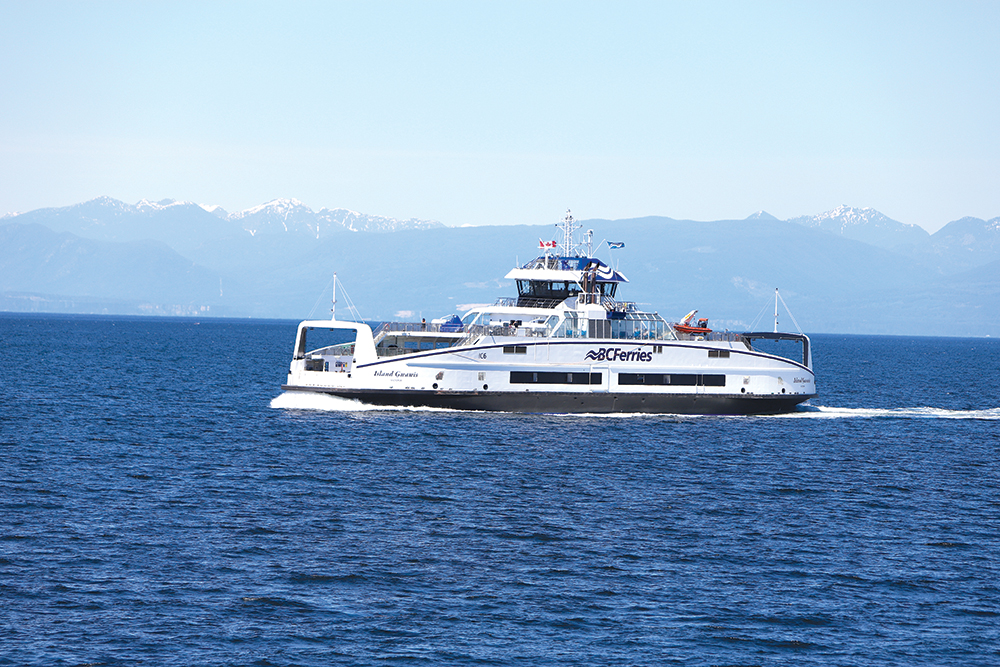Derek Kilbourn
Sounder News
BC Ferries will not shift the Gwawis schedule to starting one sailing later on the schedule, as had been requested by the Gabriola Ferry Advisory Committee (FAC).
The FAC met on Gabriola on September 18 with staff from BC Ferries in a meeting open to the public.
Steve Earle, co-Chair for the FAC, said the response from BC Ferries to the request was that such a shift would cause congestion in the mornings.
Earle said, “it would be useful to see the data on which that [decision] was made.”
The FAC is concerned that the late afternoon congestion in Nanaimo, especially in the summertime, is becoming a serious problem. The congestion coincides with the end of the day with Gwawis, and it coincides with the meal break for Kwigwis.
“We want to discuss possibility of adding a sailing at end of the Gwawis day, several days a week in June, july, August.”
He reiterated, the request was not for every day of the week, and only for June to August.
The route, he said, “is quite seriously congested there in the summer months.”
Heather O’Sullivan, co-Chair for the Gabriola FAC, acknowledged BC Ferries is, “in a difficult situation, the length of shift, the time you have the boat sailing. We are aware of the fact it’s a difficult situation.
“I’m sure you’re also aware of what it gets like in the late afternoon and around dinnertime, in particular in the summer.
“People are waiting 3 to 4 hours – waiting to get home. In not the best place to be waiting for 3 to 4 hours. You are getting up close and personal with a lot of social issues while waiting for a ferry.
“It’s not working. The only way it will work is by getting an extra sailing. We know that is hard. But we are asking for creative solutions.”
O’Sullivan noted and expressed gratitude to BC Ferries staff for those times when the terminal was so backed up that extra sailings were made to get everyone home.
“We’re grateful when the Gwawis crew has done an extra sailing. There have been a number of situations where you’ve been able to provide that extra service. But what we’ve seen this summer is we need that on a more than occasional basis.
“It does need to be solved, and it is not going to be solved without extra service. We need that extra sailing, we really do.
“That problem will only get worse if you look at where the ridership is going.”
Tamara Olsen with BC Ferries Communications said staff sees potential for a lot of congestion in the morning if the schedule is shifted to the evening.
“Our concern is we want to make sure people can get to their jobs.”
O’Sullivan said, “we want that to, which is why we say massaging the schedule isn’t the solution.
“We need one more round trip of sailings.”
“We’re not asking for year round, or all week, but we’re asking for it to avoid people sitting for three to four hours in their cars in the summer on the street to get a boat.”
FAC member Carly McMahon said when the Island Class ferries arrived, Gabriola was excited.
Now, 18 months later, “I already feel like we’ve outgrown these ferries. We had the Quinsam for over 30 years. We can’t do this [current] schedule for 30 years. Sitting in a ferry for three hours for anybody is ludicrous.
“When we got the Quinsam, the population was 1,200.
“That served us till we hit 3,500.
“We’re saying these [Island Class] aren’t big enough.
“One sailing would have helped us this summer. It won’t help us next summer. People are lined up to the Helijet terminal because you don’t have enough staff.
“But are you going to have enough staff in five years? Or is there a plan?”
During the public portion of the meeting, the topic was revisited, with BC Ferries staff hearing how people are not sitting for three to four hours a few times a year – such as when they go on a holiday via the major routes.
Rather, people are sitting cars for that kind of time, many nights a week, for multiple weeks and months at a time, as part of their daily lives.
FAC member Ivan Bulic said he thinks Gabriolans appreciate this is a new service.
“You can see how it’s working and not working. My concern is the human aspect. Sitting in the hot sun, for two to three hours, there’s no water, no washrooms, no information. Those of us who live here are perhaps aware of how things work. Visitors come, they see the line, they don’t know how long it’s going to take.
“We have kids, elders, we have people who are ill, who have all kinds of conditions. To sit in a hot car is not easy without fresh water.
“If this is going to be a case, I don’t know where BCF responsibility lies with it’s customers. Certainly some of those conditions are not just uncomfortable, but also quite dangerous.”





Recent Comments